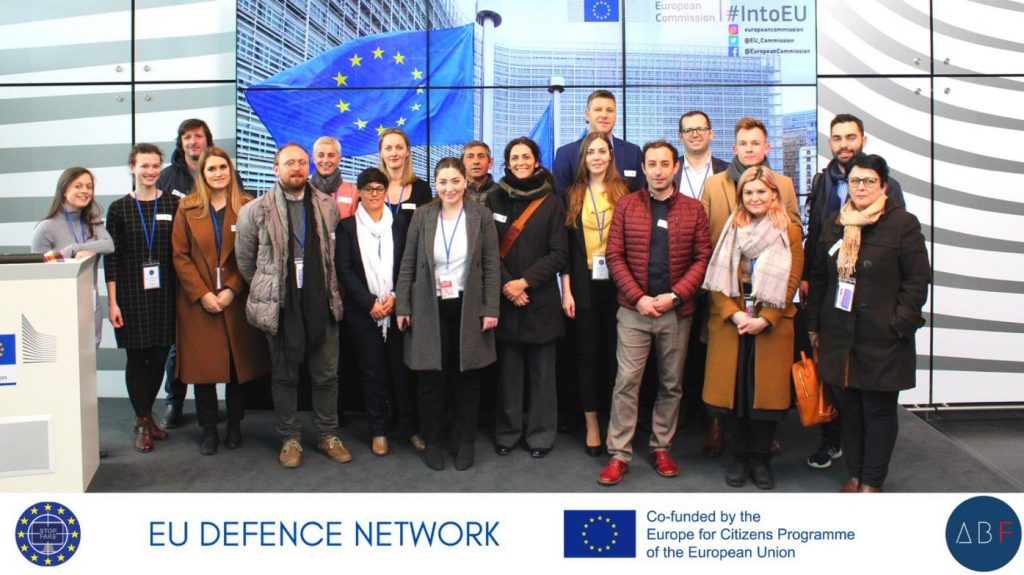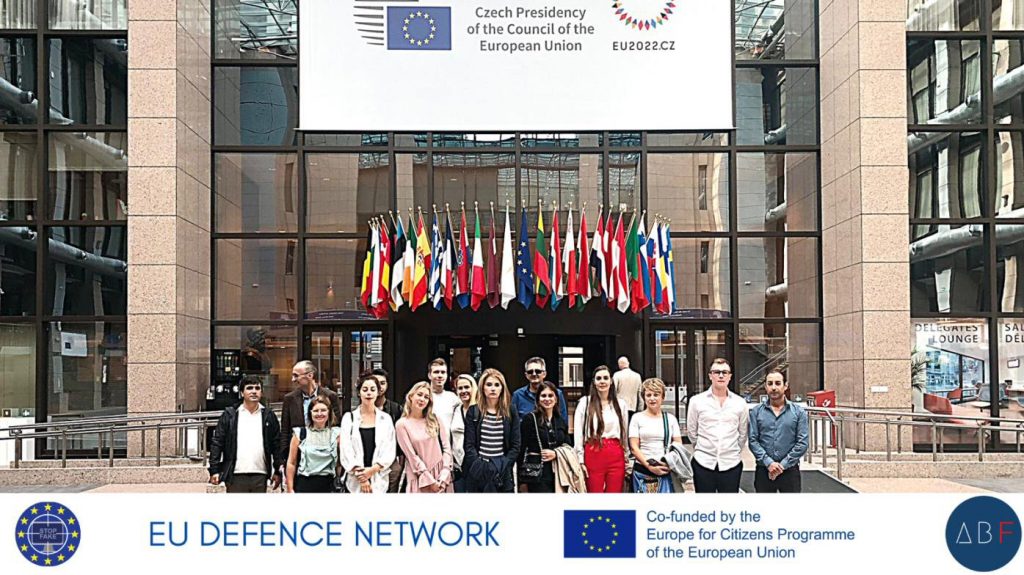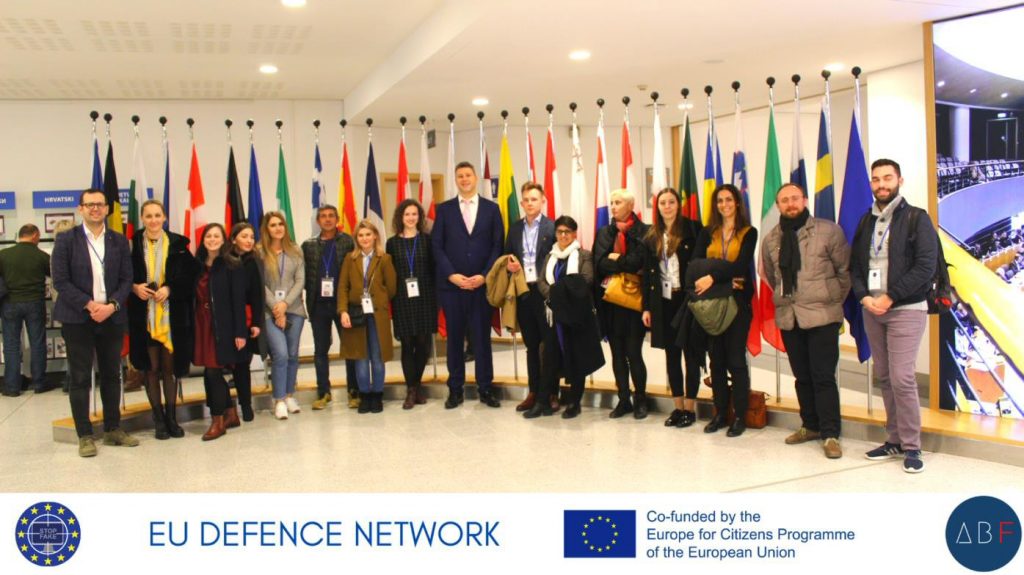DEFENCE
Main objective of the project is to involve municipalities, organizations, private associations, stakeholders, experts and CSOs, NGOs, citizens and young people, in order to raise awareness on current topics linked to Euroscepticism intended as a principled opposition to the EU and European integration.
The general objectives are:
- To foster European citizenship and improve conditions for civic and democratic participation at EU level
- To encourage democratic participation of citizens at EU level
- To support concrete participation in the EU policy-making process
This project will give to the citizens an opportunity to express what kind of Europe they want and to outline their long-term vision for the future of European integration. The debates will be based on the concrete achievements of the European Union and on lessons learnt from history. The debates should as well reflect on current trends and enable participants to challenge Euroscepticism and to suggest possible actions that the European Union could undertake in order to:
- foster a sense of belonging to Europe;
- understand the benefits of the European Union;
- reinforce the EU’s social and political cohesion.
The debate on the future of Europe of this project should not be limited to those already supporting the idea of the European Union, but also reach out to citizens who reject or put in question the European Union and its achievements or remain indifferent. The ambitious aim is to try to channel criticism of the EU into a useful, constructive and positive driver for European integration in the long run and to help the EU to come closer to its citizen and to reflect on a new narrative for Europe, citizen-oriented, forward-looking and constructive, that would be more engaging for the younger generation in particular. This project will lead the debates about concrete ways to create a more democratic Union, so as to enable citizens to re-engage with the EU and develop a stronger sense of ownership of the European project.
Project abstract
Our EU open democratic societies depend on the ability of citizens to access a variety of verifiable information so that they can form a view on different political issues. In this way, citizens can participate in an informed way in public debates and express their will through free and fair political processes. These democratic processes are increasingly challenged by deliberate, large-scale, and systematic spreading of disinformation.
Euroscepticism has moved towards mainstream political and popular culture. Eurosceptic movement gain more traction on people with emotional and simplified rhetoric rather than the rational, complex and facts-based reasoning that we – civil society – tend to provide. Eurosceptic movement gain more public support, threatening the legitimacy and popularity of the European process of integration.
People with high levels of media literacy have a better understanding of the EU, adopt a position, make their own conclusions, discerns truth from fake news, not follow trends, and can have a better opinion and judgments on achievements of the EU and benefits. On the other hand, people with low levels of media literacy are vulnerable, affected, impressed, and have conflict facing Eurosceptic narratives.
To fight against these issues, EU Defence Network aims to find ways to promote good media literacy training practices. The main focus is the improvement of media literacy levels among young people through the development of a pool of media literacy experts working with youth in schools and in non-formal contexts.
Focusing on the detection and exposure of trending narratives, disinformation channels and disinformation techniques, the ambitious aim of this project is to try to channel criticism of the EU into positive driver for the European integration in the long run and to help the EU to come closer to its citizen and to increase their resilience.
EU Defence Network foresees the participation of 18 EU countries.
Work Programme
The project foresees five international events as follow :
- 1st Bruxelles (Belgium): Kick-off meeting
- 2nd Bucharest (Romania): International training course
- 3rd Budapest (Hungary): Strategies for Introducing Media literacy in the middle schools
- 4th Sevlievo/Sofia (Bulgaria): Open debates, conference, laboratories
- 5th Bruxelles (Belgium): Final Conference, presentation of results, twinning ceremony
The project “Debating the Future of Europe and Challenging Euroscepticism: a journey into media literacy to fight Eurosceptic narratives” was funded with the support of the European Union under the Programme “Europe for Citizens”. 5 events have been carried out within this project:
Event 1: The aim of the event was to discuss about the state of the art of the media literacy in EU and how to increase the level. During the kickoff meeting organized in Brussels, the consortium of partners and the objectives of the EUDEFENCE project were presented. The consortium also presented a detailed description of the programme of activities. Then 2 information visits to the European Commission and European Parliament have been organized: ” The EC contribution on impact of different EU policies, the concrete achievements of the EU and the lesson learnt from history” and “EP contribution on “How to better understand the democratic functioning of the EU”. Debates between experts and participants.
- Location / Dates: The event took place in Brussels (Belgium), from 17/02/2020 to 20/02/2020
- Participation: The event involved 61 citizens from 17 countries, including:
1 participant from the city of Athens (Greece)
1 participant from the city of Lezha (Albania)
42 participants from the city of Brussels (Belgium)
1 participant from the city of Novo Mesto (Slovenia)
1 participant from the city of Prague (Czech Republic)
2 participants from the city of Pristina (Kosovo)
1 participant from the city of Rijeka (Croatia)
1 participant from the city of Budapest (Hungary)
1 participant from the city of Demir Kapija (Republic of North Macedonia)
1 participant from the city of Colletorto (Italy)
1 participant from the city of Valencia (Spain)
1 participant from the city of Guadassuar (Spain)
1 participant from the city of Paphos (Cyprus)
1 participant from the city of Pelplin (Poland)
1 participant from the city of Paredes (Portugal)
1 participant from the city of Xghajra (Malta)
1 participant from the city of Bucharest (Romania)
2 participants from the city of London (UK)

Event 2: The aim of the event and its core activity has been the “EuandME transnational training course” tailored for youth workers aiming at promoting media literacy training practices. In addition, debates on digital literacy and especially on the role of media literacy in building European Citizenship with focus on youth have been organized.
- Location / Dates: The event took place in Bucharest (Romania), from 28/09/2020 to 02/10/2020
- Participation: The event involved 76 citizens from 16 countries, including:
1 participant from the city of Brussels (Belgium)
2 participants from the city of Paredes (Portugal)
1 participant from the city of Rijeka (Croatia)
1 participant from the city of Athens (Greece)
7 participants from the city of Colletorto (Italy)
1 participant from the city of Demir Kapija (Republic of the North Macedonia)
1 participant from the city of Dusseldorf (Germany)
1 participant from the city of Vienna (Austria)
1 participant from the city of Sofia (Bulgaria)
1 participant from the city of Lietuva (Lithuania)
1 participant from the city of Novo Mesto (Slovenia)
1 participant from the city of Paphos (Cyprus)
1 participant from the city of Prague (Czech Republic)
2 participants from the city of Budapest (Hungary)
4 participants from the city of Valencia (Spain)
50 participants from the city of Bucharest (Romania)

Event 3: The aim of the event has been to discuss about strategies for introducing digital literacy in schools, open debates and workshops on the media literacy and countering fake news.
- Location / Dates: The event took place in Rijeka (Croatia), from 21/02/2022 to 24/02/2022
- Participation: The event involved 76 citizens from 16 countries, including:
53 participants from the city of Rijeka (Croatia)
2 participants from the city of Lezha (Albania)
1 participant from the city of Brussels (Belgium)
1 participant from the city of Paphos (Cyprus)
2 participants from the city of Prague (Czech Republic)
1 participant from the city of Athens (Greece)
2 participants from the city of Pristina (Kosovo)
1 participant from the city of Paris (France)
2 participants from the city of Pelplin (Poland)
2 participants from the city of Paredes (Portugal)
2 participants from the city of Demir Kapija (Republic of the North Macedonia)
2 participants from the city of Bucharest (Romania)
1 participant from the city of Novo Mesto (Slovenia)
1 participant from the city of Guadassuar (Spain)
1 participant from the city of Colletorto (Italy)
1 participant from the city of Budapest (Hungary)
1 participant from the city of Bonn (Germany)

Event 4: The aim of the event was to organize debates around the topics of “Digital skills and media literacy for active citizenship” and “Teaching Democracy: A Media Literacy Approach”. Laboratories with focus on populism, nationalism and democracy have been organized and led by experienced journalists.
- Location / Dates: The event took place in Demir Kapija (Republic of North Macedonia), from 20/06/2022 to 23/06/2022
- Participation: The event involved 76 citizens from 16 countries, including:
53 participants from the city of Demir Kapija (Republic of the North Macedonia)
2 participants from the city of Bucharest (Romania)
1 participant from the city of Budapest (Hungary)
1 participant from the city of Bologna (Italy)
1 participant from the city of Barcelona (Spain)
2 participants from the city of Paredes (Portugal)
3 participants from the city of Brussels (Belgium)
2 participants from the city of Lezha (Albania)
2 participants from the city of Pristina (Kosovo)
2 participants from the city of Prague (Czech Republic)
2 participants from the city of Dalgopol (Bulgaria)
1 participant from the city of Rijeka (Croatia)
1 participant from the city of Novo Mesto (Slovenia)
1 participant from the city of Pelplin (Poland)
1 participant from the city of Paphos (Cyprus)
1 participant from the city of Bonn (Germany)

Event 5: Presentation of the project results and activities, open debates on fake news and online disinformation between EU Commission speakers and experienced journalists, “Conference on the future of Europe held in the EU Commission”. Visits to the EU Council and EU Parliament.
- Location / Dates: The event took place in Brussels (Belgium), from 28/08/2022 to 31/08/2022
- Participation: The event involved 76 citizens from 14 countries, including:
53 participants from the city of Brussels (Belgium)
3 participants from the city of Lezha (Albania)
4 participants from the city of Prague (Czech Republic)
1 participant from the city of Paphos (Cyprus)
2 participants from the city of Rijeka (Croatia)
1 participant from the city of Athens (Greece)
2 participants from the city of Pristina (Kosovo)
1 participant from the city of Bari (Italy)
1 participant from the city of Budapest (Hungary)
2 participants from the city of Paredes (Portugal)
1 participant from the city of Vigo (Spain)
2 participants from the city of Bucharest (Romania)
2 participants from the city of Novo Mesto (Slovenia)
1 participant from the city of Pelplin (Poland)
Programme and action:
Europe for Citizens Programme, Networks of Towns
Dates:
1 September 2019 - 31 March 2021
Venue:
Brussels, Bucharest, Budapest, Sevlievo
Number of participants:
23
Participating countries:
- Albania
- Belgium
- Bulgaria
- Croatia
- Cyprus
- Czech Republic
- Greece
- Hungary
- Italy
- Kosovo
- Lithuania
- Malta
- Northern Macedonia
- Poland
- Portugal
- Romania
- Slovenia
- Spain